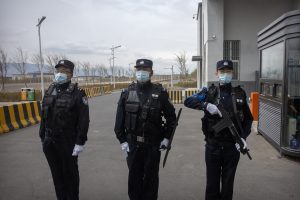The Xinjiang Police Files, published this week by the Victims of Communism Memorial Foundation in cooperation with a media consortium including the BBC, USA Today, ICIJ, and Der Spiegel, is an astounding treasure trove of images, documents, speeches, and spreadsheets of detainees detailing efforts by the Chinese Communist Party to wipe out all traces of identity and culture among its Uyghur population in China’s far-western Xinjiang region.
One of the secret documents that the files expose is a speech given in June 2018 by Zhao Kezhi, China’s minister of public security. This document, which is marked “Classified Document, Return After Reading,” offers a naked insight into the thinking and mindset of the CCP, and its rationale for the coercive measures it has taken on the Uyghur people as well as other Turkic minorities.
Equally as important, Zhao’s speech pointedly and repeatedly identifies Chinese President Xi Jinping as the origin of the policies being wrought upon Uyghurs in Xinjiang. In a speech which in English is 10 pages long, “General Secretary Xi” appears 14 times, referring always to Xi by his Chinese Communist Party title.
Zhao opens by squarely identifying Xi as the primary architect and sponsor of the drive to detain without trial hundreds of thousands of people.
The first line of Zhao’s speech says, “This investigation study visit to Xinjiang was approved by General Secretary Xi Jinping and Premier Li Keqiang; fully reflecting the great importance, concern and support of the CPC Central Committee with Comrade Xi Jinping at its core for the work in Xinjiang.”
He continues:
The purpose of the investigation study visit is to implement General Secretary Xi Jinping’s strategy for governing Xinjiang and the important instructions given on January 6, to further advance the fight against terrorism, to summarize and study the good experience and good practices of Xinjiang’s counterterrorism and stability maintenance work, with a focus on doing some investigation study on the management of prisons and the southward development of the Xinjiang Production and Construction Corps.
Note the reference to “management of prisons.” Zhao identifies Xi as the chief strategist of the practices and policies that led to the arbitrary detention of roughly one million people in Xinjiang.
The conclusion is that this direct connection to the “prisons” is something of which Xi Jinping would be proud. Zhao wouldn’t have said it if there was not explicit approval to do so.
Unsurprisingly for a senior CCP member, the theme of Zhao’s speech focuses on “stability.” The entire purpose of the measures being taken in Xinjiang is to create and maintain social and political stability; nothing is more valued.
Zhao identifies 10 “well-done” aspects of the campaign to quell dissent and quash the forces against stability in Xinjiang. The second of those is “de-extremification,” which leads to “having controlled the sources well.” To begin with, regional authorities, he said, have “resolutely banned underground preaching and studying of the Quran.”
Better yet, they have succeeded “to ‘break the lineages, break the roots, break the connections, break the origins’ in regard to the inheritance system of religious extremism,” Zhao said.
The third achievement of Xinjiang authorities, Zhao said, is “having done a good job in the work with the masses. [Xinjiang] normalized the promotion of ‘ethnic unity – one family’ and ethnic unity friendship activities, pushed thousands of cadres at all levels to go to the grassroots level, achieved a full coverage of villages – cadres living with households, creating a cohesion [between] people’s hearts to the greatest extent.”
This praise from an enforcer of the policies of the Chinese state validates the testimony of Uyghurs who have had to “host” ethnically Han “relatives” in their homes for weeks and months at a time, under the implied threat of arrest and detention should they not agree. This program, straight from the pages of a horror story, involves “inviting” in strangers who show up at Uyghur homes to stay as “guests” for any length of time, all the while following and questioning terrorized Uyghur family members, including children. Many of these mandatory guests are men, and many Uyghur women have reported sexual abuse – no surprise when Uyghur families are ordered to share not only their homes but their beds with these strangers.
Given the evidence of those who have had to suffer this unimaginable invasion of privacy, with the specter of life in detention hanging over them, Zhao’s statement that the practice creates “cohesion” between people’s hearts not only acknowledges the practice from its source, but also reveals how removed he, and by extension, senior leadership in general, is from the truth of its effect.
The parallels between China’s zero-tolerance COVID policy and what we now know for certain is China’s zero-tolerance Uyghur policy are stark. Both represent diseases, from the CCP’s point of view. One, COVID-19, is an actual disease. The other is a disease of the mind, inclination, character, ethnicity, and most of all of the religious beliefs of the Uyghur citizens of China. From the CCP’s perspective, both are the same; both are viruses that must be eradicated at all costs. There is no halfway point, no compromise, no tolerance to live with perceived risk.
There are volumes to be written from this collection of evidence. The story has only just begun. In the meantime, we are offered in this cache of materials undeniable proof of the extent of China’s campaign against its Uyghur population, not just those who have been identified as extremists. We also are told by the sources who know best just who it is prosecuting the case.
Xi Jinping’s own father was purged and sent to prison in a case of political machination. Xi himself was sent to the countryside for re-education, living in crude circumstances for years. Yet decades later, those experiences do not seem to resonate with China’s leader in ways that would temper his treatment of an ethnic minority of China. Quite the opposite.
































